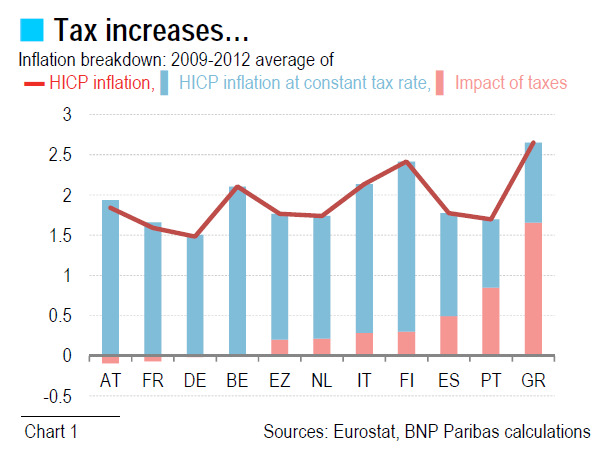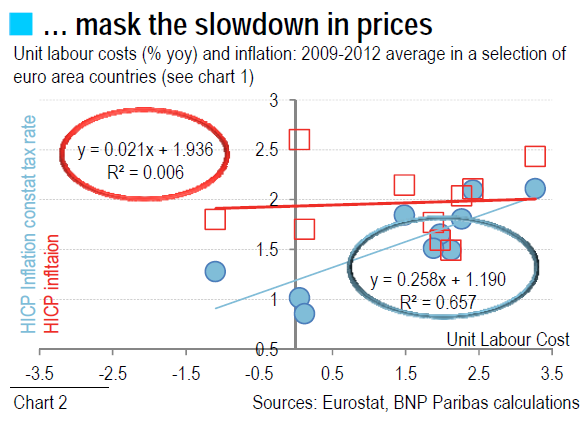The eurozone’s peripheral countries have embarked on a long and difficult adjustment process, but it is beginning to pay off. This can be seen in the absorption of current account deficits in several countries. In Spain, Ireland and Portugal, current account balances have almost swung back to or have surpassed the levels that prevailed when they joined economic and monetary union (EMU). Of the eurozone’s 17 member states, only Greece and Cyprus are still reporting current account deficits higher than the European Commission’s benchmark (-4% of GDP).
Of course, these adjustments largely reflect the drop off in imports that accompanied the decline in purchasing power and domestic demand. But that is not the only factor at play. In Spain, for example, exports are now 12% higher than the pre-crisis peak, a performance that surpasses Germany. Indeed, rising exports and declining domestic demand are two trends that cannot be disassociated: although the goal of the internal devaluation process is to restore competitiveness, it cannot be achieved without adjusting domestic demand.
Eurostat data published this week show that labour cost adjustments are continuing in the eurozone’s peripheral countries. In Q3 2012, Spanish unit labour costs declined for the second consecutive quarter by more than 3% yoy, while in Greece the decline was still nearly 6% yoy. Q3 data are not available yet for Portugal, but unit labour cost adjustment process accelerated in previous quarters.
To be effective, the decline in unit labour costs (in absolute terms or relative to its main competitors) must result in a decline in output prices. In the export sector, price declines are all the more important for countries specialising in low value-added goods, for which price competitiveness plays a key role (this is often the case for the countries under review). Yet prices of non-tradable goods and services must also be adjusted.
First, this helps limit the loss of purchasing power induced by lower wages. Second, it is crucial that the profitability of these protected sectors does not improve relative to export sectors, much to the contrary. The reallocation of domestic resources to export sectors is necessary in the medium-term to invest in product lines, expand the industrial base, and strengthen and consolidate the gains in competitiveness achieved through devaluation.
It is hard to know to what extent the slowdown in unit labour costs is effectively transmitted to prices using the usual inflation data, which does not seem to be significantly weaker in the economies undergoing internal devaluation. Yet these economies are also the ones in which governments have raised indirect taxes the most in recent years to reduce budget deficits (Chart 1).

Eurostat published consumer price indexes at constant tax rates, which can be used to distinguish between these two effects. Apparently, the absence of a correlation between the growth of wage costs and total inflation (red series in Chart 2) results from these tax increases. If we exclude this impact from the inflation series (blue series in chart 2), we can clearly see that since the beginning of the crisis, the endogenous slowdown in prices has been much sharper in the economies were labour costs have slowed up most.
BY Frédérique CERISIER , Clemente DE LUCIA
- English (UK)
- English (India)
- English (Canada)
- English (Australia)
- English (South Africa)
- English (Philippines)
- English (Nigeria)
- Deutsch
- Español (España)
- Español (México)
- Français
- Italiano
- Nederlands
- Português (Portugal)
- Polski
- Português (Brasil)
- Русский
- Türkçe
- العربية
- Ελληνικά
- Svenska
- Suomi
- עברית
- 日本語
- 한국어
- 简体中文
- 繁體中文
- Bahasa Indonesia
- Bahasa Melayu
- ไทย
- Tiếng Việt
- हिंदी
The Week In The Eurozone: Efforts Begin To Pay Off
Published 12/23/2012, 05:29 AM
Updated 03/09/2019, 08:30 AM
The Week In The Eurozone: Efforts Begin To Pay Off
3rd party Ad. Not an offer or recommendation by Investing.com. See disclosure here or
remove ads
.
Latest comments
Install Our App
Risk Disclosure: Trading in financial instruments and/or cryptocurrencies involves high risks including the risk of losing some, or all, of your investment amount, and may not be suitable for all investors. Prices of cryptocurrencies are extremely volatile and may be affected by external factors such as financial, regulatory or political events. Trading on margin increases the financial risks.
Before deciding to trade in financial instrument or cryptocurrencies you should be fully informed of the risks and costs associated with trading the financial markets, carefully consider your investment objectives, level of experience, and risk appetite, and seek professional advice where needed.
Fusion Media would like to remind you that the data contained in this website is not necessarily real-time nor accurate. The data and prices on the website are not necessarily provided by any market or exchange, but may be provided by market makers, and so prices may not be accurate and may differ from the actual price at any given market, meaning prices are indicative and not appropriate for trading purposes. Fusion Media and any provider of the data contained in this website will not accept liability for any loss or damage as a result of your trading, or your reliance on the information contained within this website.
It is prohibited to use, store, reproduce, display, modify, transmit or distribute the data contained in this website without the explicit prior written permission of Fusion Media and/or the data provider. All intellectual property rights are reserved by the providers and/or the exchange providing the data contained in this website.
Fusion Media may be compensated by the advertisers that appear on the website, based on your interaction with the advertisements or advertisers.
Before deciding to trade in financial instrument or cryptocurrencies you should be fully informed of the risks and costs associated with trading the financial markets, carefully consider your investment objectives, level of experience, and risk appetite, and seek professional advice where needed.
Fusion Media would like to remind you that the data contained in this website is not necessarily real-time nor accurate. The data and prices on the website are not necessarily provided by any market or exchange, but may be provided by market makers, and so prices may not be accurate and may differ from the actual price at any given market, meaning prices are indicative and not appropriate for trading purposes. Fusion Media and any provider of the data contained in this website will not accept liability for any loss or damage as a result of your trading, or your reliance on the information contained within this website.
It is prohibited to use, store, reproduce, display, modify, transmit or distribute the data contained in this website without the explicit prior written permission of Fusion Media and/or the data provider. All intellectual property rights are reserved by the providers and/or the exchange providing the data contained in this website.
Fusion Media may be compensated by the advertisers that appear on the website, based on your interaction with the advertisements or advertisers.
© 2007-2024 - Fusion Media Limited. All Rights Reserved.
